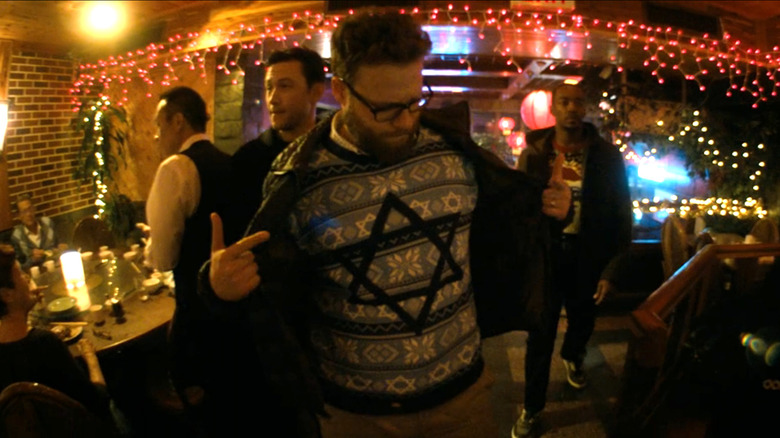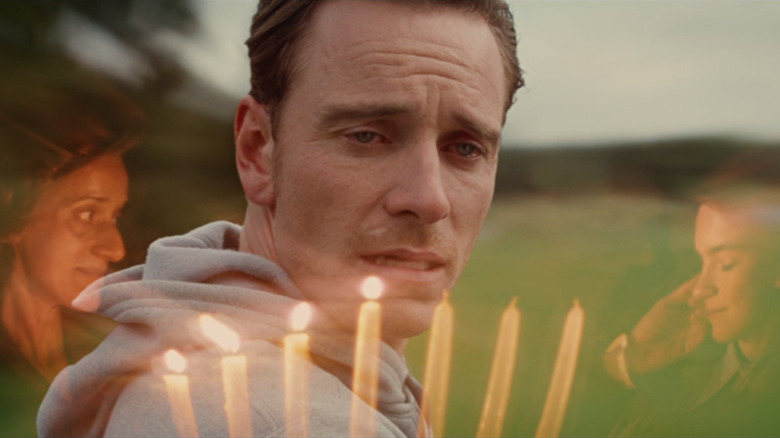It's More Important Than Ever For Hollywood To Give Us The Hanukkah Movies We Deserve
In late November, "The Guardians of the Galaxy Holiday Special" was released on Disney+. The short film from director James Gunn reunites the Marvel Cinematic Universe's most unlikely heroes as they try to give their friend Peter (Chris Pratt) a dose of Christmas cheer. It's cheesy in the best kind of way and sweet as a candy cane to its core.
But it's baffling that this special presentation has the word "holiday" in its title, a term that suggests inclusivity, when it's a Christmas special through and through. No other holiday, even Hanukkah, is given so much as a passing mention. Christmas specials are delightful, but why pay lip service to other winter holidays by titling it a "holiday special" when it would have been more honest to call it "The Guardians of the Galaxy Christmas Special"?
Alas, the "Guardians" special is the rule, not the exception. While countless Christmas specials are released each year, the number of Hanukkah-themed works remains abysmally low. If you're Jewish, it's easy to relate to Kyle Broflovski on "South Park" singing, "It's hard to be a Jew on Christmas."
Indeed, it's hard to be a Jew in general, and at no time are we more aware of our minority status in American culture than at Christmastime. Complaining about that fact is a sure way to attract vitriol from people claiming we're just being buzzkills. And so, we don't complain. We retreat to Chinese restaurants on Christmas Eve, hide our heads in a bowl of lo mein, and wait until December 26 to cautiously emerge.
But maybe it's high time to start kvetching. Maybe it's time to demand that Hollywood give us the Hanukkah movies we've always dreamed of. After all, Hanukkah is a celebration of miracles.
Hanukkah is treated like an off-brand Christmas
If, as a Jew, you've ever walked into a department store during the holiday season, you've likely noticed something amusing. While the Christmas aisles stretch on endlessly and the entire store is decked in holly jolly colors, the Hanukkah section is a small, out-of-the-way shelf full of whatever items the store's manager thinks we have use for. The selection of products on offer is often comically wrong. It's not uncommon to see matzah — the flatbread we eat during Passover in the springtime — alongside a few cheap dreidels and maybe some paper napkins emblazoned with the Star of David. It's funny because it's a harmless microcosm of how little the larger population understands Judaism.
The same applies to holiday movies. The Christmas movie genre is an industry unto itself, as evidenced by this Entertainment Weekly article explaining when and where to watch each of the staggering 171 new Christmas movies debuting during the 2022 holiday season. By contrast, as noted by the Washington Post, the three Hanukkah movies that Hallmark and Lifetime released in 2019 are actually Christmas movies in disguise and contain deeply concerning antisemitic tropes. (It's worth mentioning for the sake of context that, as noted by Salon, Hallmark only introduced Black romantic leads to their Christmas movies in 2018.)
As noted by Fansided, Netflix isn't doing any better, but at least the streamer has the decency to produce no Hanukkah movies at all rather than shoehorning a Hanukkah plot into a Christmas film. The purpose of this writing is not to act like a Grinch. Those who celebrate Christmas deserve as many movies as they care to watch. But is it so unreasonable to ask for one or two Hanukkah movies — real Hanukkah movies — alongside them?
The existing Hanukkah movies are fun, but not for the whole family
The situation looks even more desperate when surveying the Hanukkah movies already in existence. Holiday movies tend to be family-friendly affairs, but the most notable Hanukkah films, such as Adam Sandler's "Eight Crazy Nights" and "The Night Before," are emphatically R-rated. For instance, the latter involves Seth Rogen's character getting high on magic mushrooms and cocaine. As funny as it is, it's not the kind of thing you can throw on and enjoy with your kids. That's neither Sandler's nor Rogen's fault. Both have their schticks and shouldn't be asked to water down their comedy. But when the only Hanukkah movies are passion projects, you end up with screwball comedies instead of feel-good family films. In other words, a movie like this year's David Harbour vehicle "Violent Night" might be made for adults, but kids have plenty of options too, such as "The Guardians of the Galaxy Holiday Special."
One might argue that, since Jews make up only about 2% of the U.S. population (via Pew Research Center), it isn't financially viable for studios to bankroll big Hanukkah movies. But do we really think all 171 Christmas movies coming out this season are raking in the big bucks? Do we think there's massive popular demand for "A Christmas Karen"?
When it comes to family-friendly Hanukkah entertainment, Jewish kids have the 1996 "Rugrats" episode "A Rugrats Chanukah" and the treasured 1995 Shari Lewis puppet show "Lamb Chop's Special Chanukah." Both are excellent ... and verging on 30 years old. I'm not sure what disproves the antisemitic canard that Jews control Hollywood more than the astounding absence of Hanukkah movies.
We need Hanukkah movies that reflect the truth of the holiday
Were Hollywood finally to produce the Hanukkah movies it has for so long demonstrated such thorough disinterest in producing, those films need not resemble Christmas movies. Though both holidays fall around the same time of year, they are not interchangeable, and movies about them need not be either.
In truth, the cultural equivalency between Christmas and Hanukkah is somewhat manufactured. Hanukkah is a relatively minor holiday on the Jewish calendar celebrating an obscure military victory by the ancient kingdom of Judea over the invading Seleucid Empire from nearby Syria. Though observed for 2,000 years, it was raised to prominence among American Jewry during the latter half of the 20th century because its themes of religious liberty and lack of strict customs made it a desirable commercial alternative to the hegemony of Christmas (via Fortune).
If Hollywood were to draw on the true meaning of Hanukkah to inform future films, such projects don't need to rival Christmas movies at the box office. Instead, they can be a genre unto themselves. They could take the form of historical war epics in the style of "Gladiator." They could touch on uniquely Jewish issues of identity and existentialism. For the family-friendly fare, we could have rom-coms that start with meet-cutes at the kosher market. And we wouldn't be the first to suggest an animated adaptation of the beloved children's book "Hershel and the Hanukkah Goblins."
Undoubtedly, these films would appeal to a far broader audience than Jews alone. But we'll never know for sure until the film industry spins the dreidel of fate and makes them a reality.



